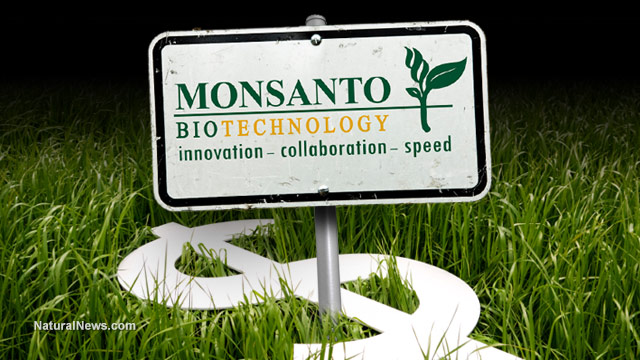by Jonathan Benson
Food is a natural human right — not in the sense that governments should be in charge of providing it for the people, but rather that human beings are endowed with the right and responsibility to grow it for themselves and reap the fruits of their labor, without interference from governments and corporations.
But the modern food supply has been hijacked by an amalgamation of both government and private industry, what is more popularly known as a fascist state, which increasingly controls what people eat and how they eat it. The crux of this largely state-controlled food supply is an industrial system of monoculture that generates high profits for the fat cats, but that also pollutes both land and food.
For the average consumer, the fact that the food supply has changed dramatically since World War II-era industrialization may not be all that apparent. After all, there’s seemingly more food than ever at the big-box grocery stores these days, and if you live in a big city, you can get almost any food you want year-round, creating an illusion of abundance.
But it’s not the availability of food that’s the issue — it’s the types and quality of the food available, and where it comes from, that tells the real story. Most of what’s stocked on grocery store shelves today contains factory-farmed ingredients that, with every purchase, fill the coffers of multinational corporations.
These same ingredients often come from crops that are heavily sprayed with pesticides like Roundup, which contains glyphosate, that pollute the environment and leave traces of poison in the final product, whether it be breads, cereals, pastries or even conventional fruits and vegetables. Genetically modified organisms (GMOs), which are also corporate-owned, are duly problematic.
“No matter what methods are used, agriculture always has some impact on the environment,” maintains the Union of Concerned Scientists (UCS). “But industrial agriculture is a special case: it damages the soil, water, and even the climate on an unprecedented scale.”
“Intensive monoculture depletes soil and leaves it vulnerable to erosion. Chemical fertilizer runoff and CAFO [concentrated animal feeding operation] wastes… create oxygen-deprived ‘dead zones’ at the mouths of major waterways. Herbicides and insecticides harm wildlife and can pose human health risks as well.”
GMOs, crop chemicals and more are destroying the environment and human health
According to the latest data made available by the Department of Agriculture’s Economic Research Service, nearly all conventional soybeans, corn, and cotton grown in the U.S. today is GMO — U.S. soybean acreage was 94 percent GMO in 2014, while cotton was 91 percent GMO and corn 89 percent GMO.
The Institute for Responsible Technology also reports that, according to 2010 data, GMO sugar beets represent 95 percent of all domestic sugar beets currently grown, while GMO canola (rapeseed) represents 90 percent of all domestic canola.
The various food derivatives made from each of these staple crops are used to create a bulk of the processed foods sold to consumers today. Everything from soy lecithin (which is added to almost every single processed food on the market) to soybean oil, canola oil, “sugar,” corn syrup, corn starch and everything in between is quietly added to your favorite crackers, cereals, cookies, dips, sauces, beverages and desserts.
Besides the many health risks associated with GMOs, which are fully outlined in the Earth Open Source GMO Myths and Truths report, the chemicals used to grow GMOs are also toxic. One example of this (besides Roundup) is neonicotinoids, a class of pesticides that has repeatedly been linked to causing colony collapse disorder, or CCD, in bee colonies.
The USDA estimates that up to one-third of our entire diet is reliant upon bees and/or other pollinators, which necessitate the production of a substantial amount of our food supply. Most fruits and vegetables, for instance, including things like apples, oranges, strawberries, onions and carrots, require bees in order to grow.
But the use of chemicals like neonicotinoids, which are applied to both GM and conventional crops (but not organic crops), is stymieing their populations. Since 2004, more than 1 million beehives have collapsed in the U.S. as a result of CCD, which even the Harvard School of Public Health now admits is largely the result of crop chemical use.
“If governments in the EU, USA and other countries fail to impose a total ban on certain chemical insecticides, not only could bees become a thing of the past,” warned F. William Engdahl, writing for the Centre for Research on Globalization.
“The human species could face staggering new challenges merely to survive. The immediate threat comes from the widespread proliferation of commercial insecticides containing the highly-toxic chemical with the improbable name, neonicotinoids.”
To learn more about how to break free from this corporate-controlled food system and grow you own highly nutritious food without electricity and at little to no cost, check out Mini-Farm Grow Boxes at FoodRising.org. Natural News.



